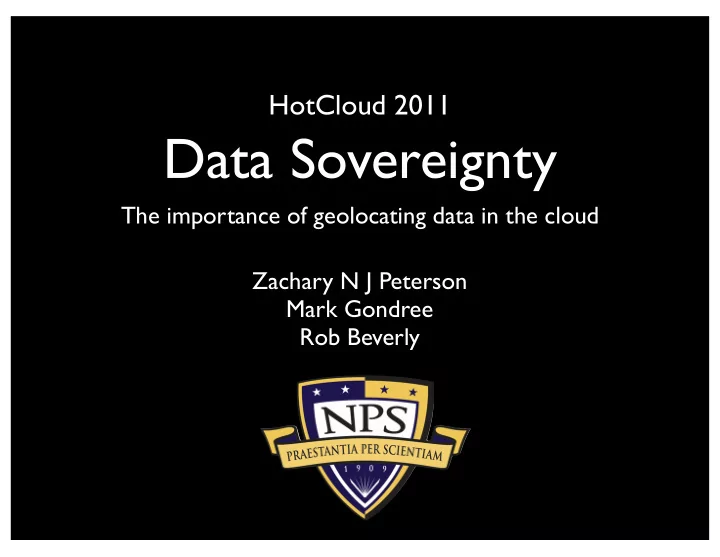

HotCloud 2011 Data Sovereignty The importance of geolocating data in the cloud Zachary N J Peterson Mark Gondree Rob Beverly
Your Data is Here
But, maybe it should be here
Or Here?
Breaking the Abstraction Is data within some political boundary Privacy protections Intellectual property protections Regulatory compliance Has data been replicated
Existing Notions of Location in the Cloud Regions of service Content-distribution networks Location guaranteed only by service-level agreements and quality of service metrics No interfaces or external techniques for establishing the location of remote data
Data Sovereignty
Data Sovereignty Protocols for establishing the location and authenticity of data in the cloud In scope : Efficiently positioning some copy of data within some geopolitical boundary Not in scope : the location of any copy of data
State of the Art
Geolocation Geolocation of hosts (NICs) Evidence gathering (whois, extrinsic evidence) Delay-based measurements Wang et al. NSDI ‘10: Street-level geolocation
Possession of Data Provable Data Possession (PDP) & Proofs of Retrievability (POR) Probabilistic challenge & response protocols Designed to minimize storage, computation, communication complexity Techniques: Homomorphic signatures, PRFs, BLS signatures, MACs
Naïve Composition Naïvely composing geolocation & PDP ( e.g. serially) provides limited assurance Data exists somewhere , and the responder is within some physical bound (Not: the data exists within some physical bound)
Adversaries DS considers a more powerful adversary One who may actively fool the challenger e.g. act as proxy for remote storage, cache subsets of data, manipulate delay measurements Adding delay increases perceived distance
An Initial Approach
An Initial Approach Leverage MAC-PDP: Tag : t i = HMAC k (D i ) Store : <D i , t i > Challenge : <D c , t c > for c indices Verify : HMAC k (D c ) =? t c
An Initial Approach Augment MAC-PDP with network delay measurements Query blocks one at a time, randomly Measure the response time Single response verifies data authenticity and calculates distance
? 68ms ? Single Challenger
68ms Multiple Challengers
An Initial Approach Requires no server-side computation Can be implemented on existing infrastructure, as part of an SLA compliance tool But, at a high communication cost And, susceptible to honest, variable overheads
Future Directions Evaluation of our initial idea Landmark placement and operation More efficient and less adversarial DS schemes Given existing infrastructure Given some future infrastructure Ways to bind computation to a location
Recommend
More recommend